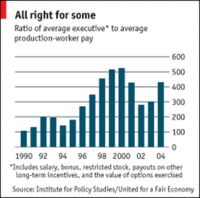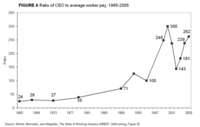Blog posts on executive payPosts selected fromManagement Blog - Engineering Blog - Investing Blog and other blogs - Kleptocrat CEOs and Their Apologists
"These CEOs act like kleptocrat dictators, taking what they can and challenging anyone to do anything about it. As with the kleptocrats they surround themselves with apologists and spread around the looting (from corporate treasuries for the CEO and the countries for the dictators) to those that support their kleptocrat ways.' continue reading: Kleptocrat CEOs and Their Apologists - Companies Trumpet Stock Buybacks and Act as Though Stock Givaways Don’t Matter
"One of the things that annoy me as an investor is how happy the executives are to grant themselves huge amount of pay in general and stock in particular. The love to giveaway huge amounts of stock to themselves and their buddies and then pretend that isn’t a cost.
Thankfully the GAAP rules changed a few years ago to require making the costs of stock giveaways show up on official earnings statements. Now, the companies love to trumpet non-GAAP earnings that exclude stock based compensation to employees." continue reading: Companies Trumpet Stock Buybacks and Act as Though Stock Givaways Don’t Matter - Peter Drucker Advocated a Ratio of 20 to 1 for CEO to Average Worker Pay
I agree with Drucker’s reasoning and the Drucker Institute’s continuing to take a stand against the bad practice of so many CEOs today. If someone wants a lot of money to lead your organization and they are qualified, fine. If they won’t run your organization for less than a king’s ransom find someone who is more interested in leading your organization than in treating it as their personal bank account. continue reading: Peter Drucker Advocated a Ratio of 20 to 1 for CEO to Average Worker Pay - Giving Executives 40% of Revenue is Insane
- Ikea Business Model; and Growth and Society
- Huge Payments to Executives for Good Luck
A recent Harvard Law School Forum on Corporate Governance and Financial Regulation article on the finding that:
90 Cents of Every “Pay-for-Performance” Dollar are Paid for Luck. I agree that mainly we award senior executives huge pay based on luck and the natural result of the organization they are a part of.
It is my personal belief that the excessive pay of executives reached such a harmful level that Dr. Deming would have added it to his list of 7 deadly diseases long ago if he were still with us. continue reading: Huge Payments to Executives for Good Luck - The Economist on Drucker
In the late 1990s he turned into one of America’s leading critics of soaring executive pay, warning that “in the next economic downturn, there will be an outbreak of bitterness and contempt for the super-corporate chieftains who pay themselves millions.”
continue reading: The Economist on Drucker - Toyota Manufacturing Powerhouse
Unusual among automakers, “they don’t hide a lot,” Coventry said. “It’s like going to the Super Bowl and having the opposite side throw their playbook on the table. It’s as if they feel they can still beat you on the field.”
Toyota has greatly advanced management practice worldwide through their actions.
In a reflection of Toyota’s team-oriented approach, its executive pay is paltry by U.S. standards. Analyst Ron Tadross at Banc of America Securities estimates the total annual compensation of Toyota’s CEO at under $1 million – about as much as a vice president at GM or Ford Motor Co. makes in a good year.
The executive pay crisis in America is a symptom of the failure of American management to understand their role. Executives are part of the system and have acted shamefully in allowing obscene pay for a few while claiming they must force others to suffer (due to “the market”). continue reading: Toyota Manufacturing Powerhouse - Excessive Executive Pay
 The excesses are so great now they will either force companies to:
- take huge risks to justify such pay and then go bankrupt when such risks fail (and some will succeed making it appear, to some, that the pay was deserved rather than just the random chance of taking a large risk and getting lucky).
- make it impossible to compete with companies that don’t allow such excesses and slowly go out of business to those companies that don’t act so irresponsibly
- hope that competitors adopt your bad practice of excessive pay (this does have potential as most people are corrupted by power, even across cultural boundaries). However, my expectation is the competitive forces of capitalism going forward are going to make such a hope unrealistic. People will see the opportunity provided by such poor management and compete with them.
As long as the pay packages were merely large, and didn’t effect the ability of a company to prosper that could continue (slicing up the benefits between the stakeholders is not an exact science). The excesses recently have become so obscene as to become unsustainable. continue reading: Excessive Executive Pay - Peter Drucker Opinion Essays from the Wall Street Journal
Is Executive Pay Excessive? In 1977, Peter Drucker's answer was, no. As pay did become excessive, Drucker became a prominent voice against the unjust pay of CEO’s.
Economically, [the] few very large executive salaries are quite unimportant. Socially, they do enormous damage. They are highly visible and highly publicized. And they are therefore taken as typical, rather than as the extreme exceptions they are.
In 1977, he was mainly worried about “the public” rising against excessive executive pay when there was no systemic problem. He didn’t seem to foresee the problem of other CEO’s believing they were entitled to such unjust pay and creating the crisis of leadership this caused later in his career. Of course the entitlement culture was not a widely held view at that point. continue reading: Peter Drucker Opinion Essays from the Wall Street Journal - Kleptocrat CEOs and Their Apologists
CEOs, and their cronies, were well paid decades ago. As their greed about their pay got to be unethical Peter Drucker started to speak out against their ethical failures. As those abuses became more extreme he increased his objections.
...
I want a CEO that is paid well and seeks their reward not by taking from the corporate treasury but by providing great jobs, customer happiness and an improved society. continue reading: Kleptocrat CEOs and Their Apologists - More on Obscene CEO Pay
 Unfortunately this reverse robin hood (steal from the workers, stock holder, customers…) and give to the CEO tale continues. Hopefully someday soon we can at least turn the momentum in the right direction (stopping these incredibly excessive “pay” packages). Even then it will take quite a deal of reducing these ridiculous “pay” packages to reach some sense of decency. continue reading: More on Obscene CEO Pay - Excessive CEO Pay
CEO’s that take such unethical large pay today are the robber barons of today and will deserve the judgement of history for the actions they take (I would imagine they are perfectly happy to take the money now and worry about opinions later). And those that approve such pay also deserve sharp criticism. continue reading: Excessive CEO Pay - More on Overpaid CEO’s
As Drucker, Buffet and many others have said CEO overpayment is bad for companies, workers and shareholders. Even when they are fired they often take away tens of millions of dollars. Absolutely ridiculous. I sure hope the bubble of CEO pay bursts soon – the only suitable comparison this century is the internet stock bubble. But every year it just gets worse. I would add overpaying CEO’s to Deming’s seven deadly diseases of western management. continue reading: More on Overpaid CEO’s - Compensation and Executive Pay at Whole Foods (2007)
the average large corporation in the United States distributes 75% of their total stock options to only 5 top executives with the remaining 25% going to everyone else in the company (actually most of the remaining 25% goes to the next level of executives below the top 5). At Whole Foods, the exact opposite is true: the top 16 executives have received 7% of all the options granted while the other 93% of the options have been distributed throughout the entire company with all Team Members eligible for a grant after 6,000 hours of service to the company.
continue reading: Compensation and Executive Pay at Whole Foods (2007)
|